Related Research Articles
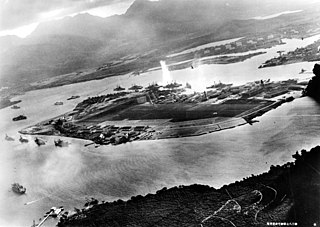
The attack on Pearl Harbor was a surprise military strike by the Imperial Japanese Navy Air Service on the American naval base at Pearl Harbor in Honolulu, Hawaii, in the United States, just before 8:00 a.m. on Sunday, December 7, 1941. At the time, the United States was a neutral country in World War II. The attack on Hawaii and other U.S. territories led the United States to formally enter World War II on the side of the Allies the day following the attack, on December 8, 1941. The Japanese military leadership referred to the attack as the Hawaii Operation and Operation AI, and as Operation Z during its planning.
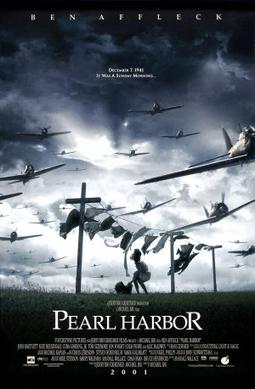
Pearl Harbor is a 2001 American romantic war drama film directed by Michael Bay, produced by Bay and Jerry Bruckheimer and written by Randall Wallace. It stars Ben Affleck, Kate Beckinsale, Josh Hartnett, Cuba Gooding Jr., Tom Sizemore, Jon Voight, Colm Feore, and Alec Baldwin. The film features a heavily fictionalized version of the attack on Pearl Harbor by Japanese forces on December 7, 1941, focusing on a love story set amidst the lead up to the attack, its aftermath, and the Doolittle Raid.

Doris "Dorie" Miller was a U.S. Navy sailor who was the first Black recipient of the Navy Cross and a nominee for the Medal of Honor. As a mess attendant second class in the United States Navy, Miller helped carry wounded sailors to safety during the attack on Pearl Harbor. He then manned an anti-aircraft gun and, despite no prior training in gunnery, officially shot down one plane, but Miller and other eye witnesses claimed the ranges of four to six.

Sammy Kaye was an American bandleader and songwriter, whose tag line, "Swing and Sway with Sammy Kaye", became one of the most famous of the Big Band Era. The expression springs from his first hit single in 1937, "Swing and Sway". He was the first to record and release the standard "Blueberry Hill" in 1940. During World War II, he co-wrote and recorded the anthemic "Remember Pearl Harbor". He was the first to record and release the no. 1 song "Daddy" in 1941. His signature tune was "Harbor Lights", a number-one hit in 1950.
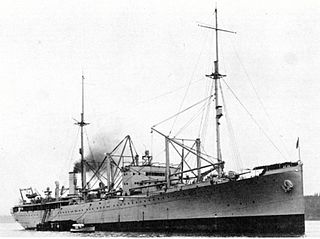
The first USS Pyro (AE–1) was an ammunition ship of the United States Navy, commissioned from 1920 to 1924 and from 1939 to 1946. Primarily operating in the Pacific Ocean, the Pyro was present during the Attack on Pearl Harbor.
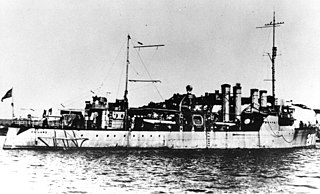
The second USS Ballard (DD-267/AVD-10) was a Clemson-class destroyer in the United States Navy during World War II. She was named for Edward J. Ballard.

Hammac was a steam tank ship built in 1920–1921 by Bethlehem Shipbuilding Corporation of Alameda for the United States Shipping Board as part of the wartime shipbuilding program of the Emergency Fleet Corporation (EFC) to restore the nation's Merchant Marine. Early in 1923 the vessel together with two other tankers was sold to General Petroleum Corporation and renamed Emidio. The tanker spent the vast majority of her career carrying oil along the West Coast of the United States as well as between West and East coast. In December 1941 she was shelled and damaged by the Japanese submarine I-17 and eventually wrecked with a loss of five crewmen.

Alphonse Emil "Tuffy" Leemans was an American professional football player who was a fullback and halfback who played on both offense and defense for the New York Giants of the National Football League (NFL). He was inducted into the Pro Football Hall of Fame in 1978 and was named in 1969 to the NFL 1930s All-Decade Team.

The "Day of Infamy" speech, sometimes referred to as the Infamy speech, was a speech delivered by Franklin D. Roosevelt, the 32nd president of the United States, to a joint session of Congress on December 8, 1941. The previous day, the Empire of Japan attacked United States military bases at Pearl Harbor and the Philippines, and declared war on the United States and the British Empire. The speech is known for its famed first line, which opened with Roosevelt saying, "Yesterday, December 7, 1941—a date which will live in infamy..."

"I'm Goin' Down" is a rock song written and performed by American singer-songwriter Bruce Springsteen. It was released on August 27, 1985 by Columbia Records as the sixth single from his 1984 album Born in the U.S.A. The song was recorded with the E Street Band in May 1982 at Power Station studio in New York City, and co-produced by Springsteen, Jon Landau, Chuck Plotkin, and Steve Van Zandt. Although Springsteen had changing ideas about the songs to put on the album, "I'm Goin' Down" was ultimately selected for inclusion.
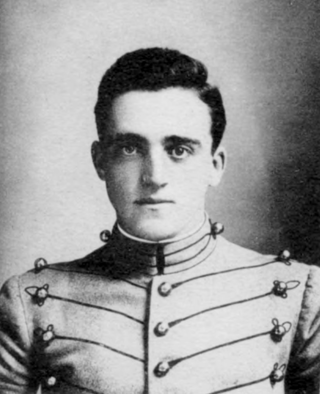
Philip Hayes was a major-general in the U.S. Army. He was the commander of the Third Service Command from 1943 to 1946. Hayes was in charge of the U.S. military's takeover, under the authority of the Smith-Connally Act, of the Philadelphia Transportation Company in August 1944 that brought to an end the Philadelphia transit strike of 1944. Earlier in his career, Hayes served as the chief of staff to Gen. Walter Short, who was the commander of the Hawaiian Department at the time of the Pearl Harbor attack, although Hayes was rotated from Hawaii back to the mainland in November 1941, shortly before the attack.

Valley Forge Flag, based in Wyomissing, Pennsylvania, is one of the largest U.S. flag manufacturers. The company was founded in 1882. It has a large wet printing facility in Olanta, South Carolina.
The 1941 Rutgers Queensmen football team represented Rutgers University in the 1941 college football season. In their fourth season under head coach Harvey Harman, the Queensmen compiled a 7–2 record and outscored their opponents 174 to 85. The team's two losses were against Syracuse (7–49) and Lafayette (0–16).

Corvus was a steam cargo ship built in 1919 by Columbia River Shipbuilding Company of Portland for the United States Shipping Board as part of the wartime shipbuilding program of the Emergency Fleet Corporation (EFC) to restore the nation's Merchant Marine. The freighter was operated on international and domestic routes through 1944. Early in 1945 she was transferred to Soviet Union as part of lend-lease program and renamed Uzbekistan. After several months of operation, the freighter was rammed by another vessel on 31 May 1945 and was beached to avoid sinking. She was subsequently raised and towed to Portland where she was scrapped in 1946.
The 1941 San Jose State Spartans football team represented San Jose State College during the 1941 college football season.

The attack on Pearl Harbor has received substantial attention in popular culture in multiple media and cultural formats including film, architecture, memorial statues, non-fiction writing, historical writing, and historical fiction. Today, the USS Arizona Memorial on the island of Oahu honors the dead. Visitors to the memorial reach it via boats from the naval base at Pearl Harbor. The memorial was designed by Alfred Preis, and has a sagging center but strong and vigorous ends, expressing "initial defeat and ultimate victory". It commemorates all lives lost on December 7, 1941.
Jack "Bones" O'Brien(néJohn Roger O'Brien; 16 October 1903 – 12 October 1982) was an American jazz pianist and songwriter from Allentown, Pennsylvania. Notably, O'Brien was pianist, composer, and arranger with the Ted Weems orchestra from 1925 through 1941.

Joseph Knefler Taussig Jr. was a United States Navy officer during and after World War II, and a Navy civilian official in the 1980s. He was the son of Vice Admiral Joseph Taussig, and the grandson of Rear Admiral Edward David Taussig.
The 1941 Boston University Terriers football team was an American football team that represented Boston University as an independent during the 1941 college football season. In its eighth and final season under head coach Pat Hanley, the team compiled a 5–3 record and outscored opponents by a total of 77 to 51. The team played its home games at the original Nickerson Field in Weston, Massachusetts.
"Remember Pearl Harbor" is an American patriotic march written by Don Reid and Sammy Kaye in the week immediately following the December 7, 1941 attack on the military facilities on the Hawaiian island on Oahu by naval forces of the Japanese navy. Sammy Kaye released a recording of the song on RCA Victor in 1942. The recording reached no. 3 on the Billboard chart.
References
- ↑ "World War II: Commemorating Pearl Harbor, 1941". Gilder Lehrman Institute of American History. 2009–2018.
- ↑ Thompson, Dorothy (January 30, 1942). "On the Record" (image 24). The Sun . San Bernardino, California. p. 24 – via Newspapers.com.(subscription required)
- ↑ Doktor, Pete (December 7, 2016). "'Remember Pearl Harbor!' and Forget All Else". The Hawaii Independent .
- ↑ LyricsMania.com
- ↑ "Remember Pearl Harbor" (image). The Baltimore Sun . Baltimore, Maryland. December 7, 1993. p. 89.(subscription required)
- ↑ "Remember Pearl Harbor" (audio). Retrieved May 16, 2019– via YouTube.